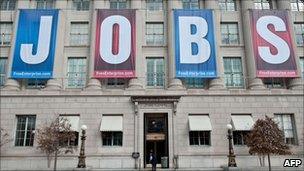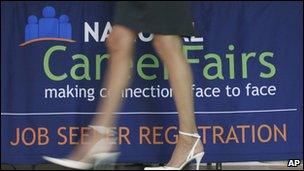US unemployment fears hit ordinary Americans
- Published
Kathy Sandru: ''It's just been a nightmare trying to find a job''
President Obama hasn't lost any of his eloquence when it comes to describing the struggle going on in the lives of many Americans.
On Tuesday the US president decried the self-inflicted crisis of the debt ceiling, contrasting it with the suffering of ordinary people.
"There's already a quiet crisis going on in the lives of a lot of families, a lot of communities across the country. They're looking for work and they have been for a while," he said.
The jobs picture in the US remains grim. The unemployment rate is above 9%. And there's growing alarm at the number of people who have been out of work for more than half a year.
Many are so discouraged that they have given up looking for work altogether.
Kathy Sandru's backyard in Sommerville, New Jersey, is a world away from the Rose Garden in Washington, where the president made his comments.
On a sunny afternoon her kids were busy playing in the backyard, running through sprinklers and playing on the slide.
These days this married mother-of-two has more time to spend with them. An insurance claims officer, she's been applying for jobs ever since she was laid off. That was over two years ago.
She did not expect it to take this long to find a job and admits it has taken an emotional as well as a financial toll.
"You feel as if... quite honestly you feel as if you're a loser."
Her unemployment cheques are exhausted. Her husband still works but his income is not enough. For this family, long-term unemployment has blighted years of planning and saving.
"We had to use my retirement fund for the expenses," she said.
Her dreams of a better future for her children are fading: "We wanted to put some money into savings so that the kids could go to college. It's hard for us to do that now."
Few jobs created
Kathy Sandru is not alone.

The number of people out of work for six months or more hit 6.4 million in June
The number of people out of work for six months or more hit 6.4 million in June. Put another way, that's 44% of all 14 million unemployed Americans.
This is the most since 1948, when the data was first recorded, according to the US Department of Labor.
Part of the reason the nation has such a large number of long-term unemployed is that they face discrimination.
There is growing evidence that some employers will only consider hiring those who are currently in work or recently laid off.
New Jersey has passed a law outlawing job adverts that prevent the unemployed from applying. Other states are considering following suit.
Surveying the worst jobs crisis since the Great Depression, Judy Conti from the National Employment Law Project is horrified.
"If we're really going to have a recovery that works, we need to get people back to work ", she said.
"And if we're only shuffling jobs among the already employed than we're really not going to be on the road to recovery any time soon."

Unemployed Americans have argued the US economy is simply not creating enough jobs
The long-term unemployed also have another problem, one related to the nature of the downturn.
Given how steep the fall into recession was, the recovery is such that there has been shallow growth at best. Successive months of disappointing jobs reports reveal an economy that is simply not creating enough jobs to bring the long-term unemployed back into the workforce.
Unless growth and job creation pick up soon, there is a growing fear that the long term unemployed such as Kathy will be consigned to a permanent and burgeoning underclass of American society.
So it is that many economists now worry that a fundamental restructuring of the US economy may be needed.
But that would require political action of a sort that seems to be beyond the powers of the president and Congress.